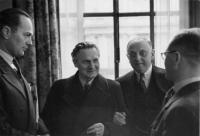Prebendary Wilson Carlile, the founder of the Church Army and by then over ninety, sent Buchman a stream of supporting messages in this period: 'I thank God for your prophetic persistence ... Go ahead. It helps us and the Kingdom of Heaven greatly . . . You are widening my vision. The top dog is more catchy than our bottom dog. Thousands of lazy lives, if they feel our Blessed Lord wants them and can use them, would buck up and be a blessing to the world.'56
Many conservative-minded people, like some of those at Hatfield, did turn away from Buchman following the publicity after the Foyle lunch. Lord Salisbury was not among them. On 7 August 1937, he combined with the Minister of Labour, Ernest Brown, Lord Davidson and the recent President of the British Academy, Professor J. W. Mackail, in a letter to The Times which read in part: 'The Oxford Group stands out as a challenge to churches of today to be up and doing. The dominating motive which animates these efforts, whether in the Group or elsewhere, is a pledge of loyalty to apply under God's guidance the spirit and principles of Christ to individual conduct and to every department of social, national and supernational life.
'We write this letter to urge the crying need of mankind that this fundamental principle should be emphasised and insistently applied broadcast throughout this and other countries. What nations imperatively require is the development of a sense of personal responsibility to bring men and women of all administrations and governments to the spirit of loyalty to God. This alone can unite a chaotic world.'57

Buchman entered 1938 with a renewed sense of urgency. 'I am trying to find an approach that will give the message more intelligently to an age that needs it, but is desperately afraid of it,' he wrote at the time. He was looking for a thought that was simple enough for millions to grasp and realistic enough for national leaders to put forward. He also wanted to shake those who, having found a rich personal experience of faith through the Oxford Group, were hugging it to themselves, and to persuade them to enter the struggle to answer the problems of the wider world.
His uneasiness was leading him to another break-out similar to those which had made him stretch beyond the local ministry in Pennsylvania, beyond the care of the students in the American colleges, and beyond the standard missionary field. It was not a new public relations angle which he sought, but a new and larger commitment for himself and any who would go with him.
The seed thought he was seeking came to him from a Swedish Socialist author, Harry Blomberg. The Swedish Labour Party had been the most successful in Europe. Operating in a period of prolonged peace, it had brought prosperity and comfort to all classes. With these had come a sense of self-sufficiency and a general rejection, in intellectual circles, of any need for God. At the same time, some labour leaders there were aware that prosperity by itself had not brought happiness, while the rise of Communism and Nazism was forcing them to reconsider whether they could for ever stay aloof from the conflicts elsewhere. Thus, Dr Alf Ahlberg, principal of the trades-union-owned training school at Brunnsvik, had recently written, 'I would be thought a fool if I were to say to so-called practical politicians, "You talk of rescuing democracy. Excellent. But faith in democracy requires faith in God." Yet I am convinced I am more of a practical politician in this statement than any of those gentlemen realises. History confirms this and I am afraid is going to confirm it in a still more frightful way.'1
Harry Blomberg was one of Ahlberg's pupils. He had brought the philosophy of the Oxford Group, which had reached him through his fellow authors in Norway, to the steelworkers among whom he lived in Borlänge. His book Vi måste börja om (We must begin again)2 illustrated the dilemma which Ahlberg outlined. His theme was, 'I had come to a dead end, just as democracy had come to a dead end. I, too, had to begin again.' The book was an immediate best-seller. Commenting upon it, and upon Ronald Fangen's two new novels and Hambro's recent book Modern Mentality, the Oslo correspondent of the New York Times Book Review wrote in his survey of the literary scene in Scandinavia: 'The supremacy of the psychoanalyst, who drew his deductions largely from observations of those who were sick in body and soul, seems to be weakening. The healthy counter-trend is setting in, a challenge to mankind to resist unthinking mass appeals (of dictatorship) and develop the individualism which can counter present-day trends.'3
261
Photo: Harry Blomberg, Swedish Socialist author, with Buchman. Blomberg's book 'We Must Begin Again' called for a moral foundation for democracy to meet the threat of totalitarian ideologies. Asked by Buchman for a message of hope, he replied: "We must re-arm morally." This gave Buchman the key thought to issue a world-wide call for Moral Re-Armament.
©Arthur Strong/MRA Productions